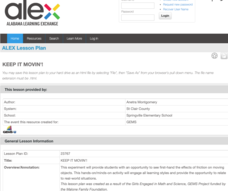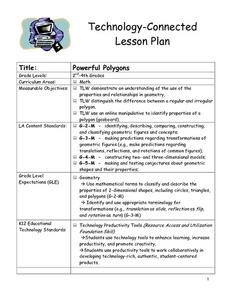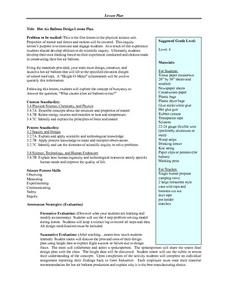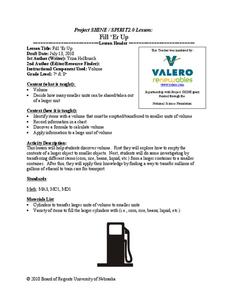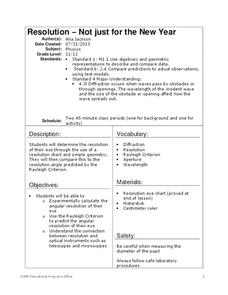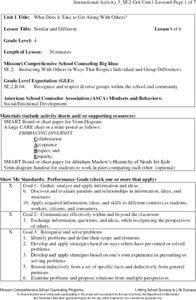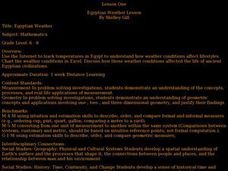Alabama Learning Exchange
Keep It Movin'!
Learners conduct an experiment to study friction. They complete a KWL chart on friction and conduct an activity about the amount of friction on a moving object. To conclude, pupils create a table or graph of the data collected and they...
Curated OER
The Solution to Pollution is Dilution
Students consider what happens to herbicides or insecticides that are used in agricultural practices, especially herbicides that are used to control noxious weeds. They become acquaint with a chemical assessment method known as...
Curated OER
To The Clock of Eras
Third graders investigate the events of geological time using a chart called a "Clock of Eras". In this geological events lesson plan, 3rd graders compare a standard clock to a geological clock. In addition, students consider periods...
Curated OER
Creeping and Crawling Observing Mealworms and Earthworms
Students observe the inherited traits in earthworms and mealworms. In this organisms activity, students view a live mealworm and earthworm on a tray and identify the body parts. Students measure the worms and observe the behavior....
Curated OER
Powerful Polygons
Students scan the classroom to find different common shapes. They listen as the teacher defines polygon and regular polygon. The teacher demonstrates regular polygons via the Internet and the "Math is Fun" web site. Students go outside...
Curated OER
Understanding How Potatoes Grow
Second graders make a KWL chart and brainstorm what they need for the project of growing potatoes. They choose one potato and plant it in water or peat moss cups and choose a location in which meets the needs of the plants and make their...
Curated OER
Botanical Discoveries
Sixth graders examine the Lewis and Clark Expedition. For this plant discovery lesson, 6th graders put in chronological order the plant discoveries of Lewis and Clark. Students understand the characteristics of leaves and find the area...
Alabama Learning Exchange
Watch That Plant Grow
Middle schoolers examine the growth of marigolds in a greenhouse environment. They chart data in spreadsheets showing plant growth over time and under a number of conditions. They record measures of plant height and greenhouse temperature.
Curated OER
Volcanic Activity in the U.S.
Students locate and map ten volcanoes in United States, create chart comparing volcanoes by last eruption, type of volcano, location, and interesting fact, and create Powerpoint slide show describing basic
information about volcanoes and...
Curated OER
Ratios in Right Triangles
Learners calculate the sides of right triangles in this trigonometric ratios lesson. They use Cabri Jr. software and TI-83 or TI-84 calculators to find the side lengths and their ratios to each other for various triangles. The provided...
Curated OER
Hot Air Balloon Design Lesson Plan
Sixth graders discuss what they know and what they want to know about hot air balloon using a KWL chart. They then use a wide array of materials to design a hot air balloon that will lift successfully in cooperative groups referring to...
Curated OER
Food Label Fun
Third graders demonstrate how to read and analyze food labels. In this nutrition lesson, 3rd graders watch a food label video and investigate labels from various canned foods. Students create a chart showing the percentage of vitamins...
Curated OER
Making a Mini Worm Habitat
Third graders create an earthworm habitat. In this worms lesson, 3rd graders construct a KWL chart about earthworms and research their habitat. Students create a mini habitat for their earthworms by using gravel, sand, cloth, and soil.
Curated OER
The Emancipation Proclamation
Students explore the historical importance of the Emancipation Proclamation. In this United States History instructional activity, students use the internet to research the specific events that were centered around the Emancipation...
Curated OER
Fill 'Er Up
Students identify how many smaller units can be found in a later unit. In this geometry lesson, students calculate the volume and the transfer amount to a smaller unit. They solve real life problems using the formula for volume.
Cornell University
Resolution—Not Just for the New Year
Experiment with optical resolution using an inquiry-based lesson. Young researchers calculate fellow classmates' optical resolutions. They apply the information to understand the inner workings of optical instruments.
Missouri Department of Elementary
Similar and Different
Using a Venn diagram, pupils compare the similarities and differences between two classmates. Next, they review the CARE acronym (Collaboration, Acceptance, Respect, Empathy) and discuss how it applies to diversity in the classroom.
Teach Engineering
Concentrating on the Sun with PVs
Concentrate to determine the best reflector design. Pairs use the engineering design process to build a reflector to increase the current output of a photovotaic panel. Teams arrive at a final design and present it to the class along...
Curated OER
Conversions: Metrics Made Easy
Students convert standard units of measurement to metric units using tape measures, meter sticks, rulers, and online conversion calculators.
Curated OER
Math is Everywhere: Part 2
Second graders identify shapes and measurements in everyday life. In this measurement lesson, 2nd graders locate rectangles in their classroom and use standard and nonstandard forms to measure them. Students view a video clip...
Curated OER
Getting to Know Soil
Students make predictions and analyze soil. In this soil properties lesson, students make predictions about soil properties for various soil samples. Students examine the types of soils and record their observations. Students analyze...
Curated OER
Egyptian Weather Lesson
Learners chart temperatures in Egypt on spreadsheet to determine how weather conditions affect lifestyles.
Curated OER
Weather Chart
Students select at least 6 cities from around the world to keep track of their high and low temperatures over a period of time.
Curated OER
Customary Measurement Conversions
Fifth graders discover in hands-on activities the relationships between the measures. They work in groups to create conversion tables using familiar measuring tools. Students solve problems requiring conversions.


